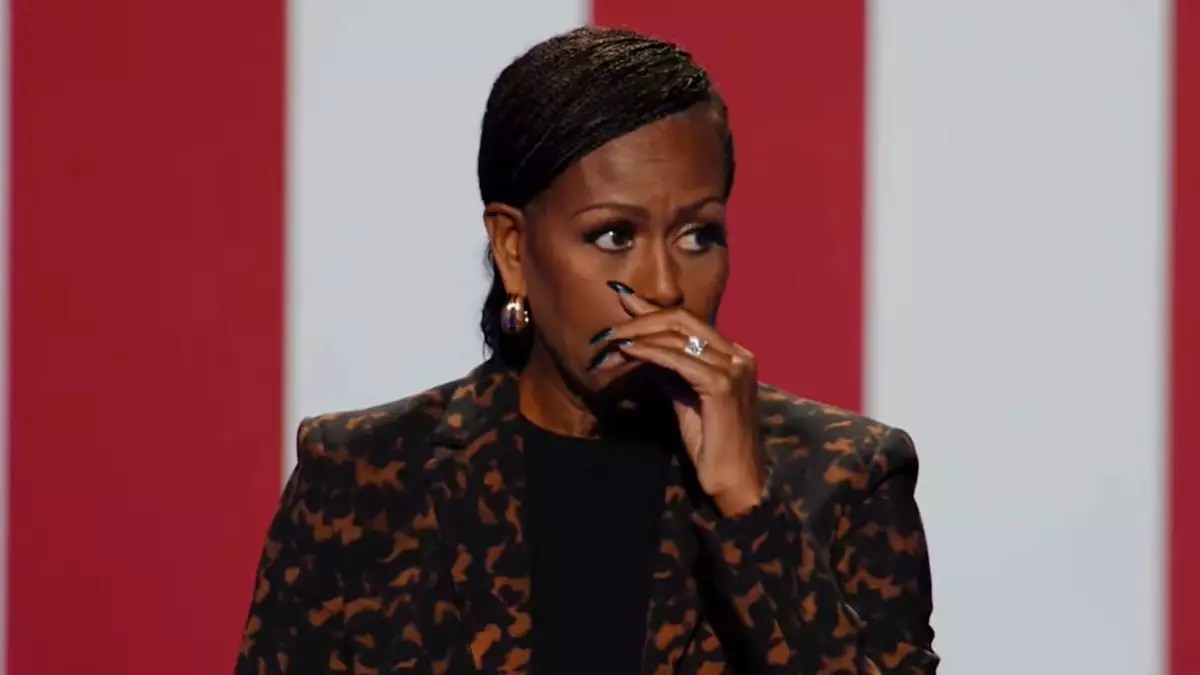On October 26, 2024, former First Lady Michelle Obama took to the stage in Michigan to support presidential candidate Kamala Harris. It was not just an ordinary rally; it became a powerful moment of vulnerability as Obama openly discussed the often-overlooked topic of women’s health, particularly the challenges surrounding menopause. Wearing an elegant tortoiseshell pantsuit by Theory, Obama captivated the audience—not only with her fashion sense but with her passionate discourse about health issues that affect countless women across the nation.
Her speech began with a poignant acknowledgment of societal stigmas surrounding women’s health, particularly the physical discomforts many endure yet rarely discuss. “We’ve been taught shame and how to hide how our bodies work,” she stated, setting the tone for a conversation that resonated deeply with many women in the audience. Her declarations served as a rallying call, emphasizing that these taboo topics require necessary scrutiny and conversation. Obama’s engagement on such a personal issue sheds light on a broader issue—how systemic silence affects women’s healthcare and well-being.
Obama’s insight into the struggles women face as they navigate menopause reflects the lingering stigma surrounding reproductive health. She articulated a profound truth when she noted, “Too many women my age have no idea what’s going on with our bodies as we battle through menopause and debilitating hot flashes and depression.” The emphasis on collective experience is vital; women often handle these struggles in isolation, ignoring the essential discussions that could foster community and support.
The emotional weight of her words was palpable as she reflected on the myriad health challenges women face. She made it clear that beyond merely experiencing menstruation, pregnancy, and menopause, women’s health encompasses a wide range of issues often overlooked—such as potential cancers and other reproductive health problems. The reality she portrayed—that “the floor falls out from under us” during such challenging times—underscores the need for comprehensive healthcare systems equipped to address these vulnerabilities.
More than just a commentary on personal struggles, Obama’s speech called attention to systemic neglect within the healthcare sector. This neglect disproportionately affects women—especially those from marginalized communities. She poignantly stated, “Most women don’t understand the breadth and depth of our reproductive lives, and that is because our experiences are neglected by science.” This observation unveils a critical gap in medical research and education, which fails to fully account for women’s health experiences in a meaningful way, thereby affecting treatment and support.
Her appeal to men in the audience reinforced the idea that women’s health issues are not solely women’s responsibilities. Men—and society as a whole—must engage in these dialogues to foster a more comprehensive understanding of the implications of healthcare policies. Obama’s compelling narrative challenged the audience to reconsider how they perceive reproductive health and the stakes involved. Through personal vignettes, she reminded them of the real-life impact of potentially devastating healthcare decisions and policies.
The Broader Implications for Society
In light of the upcoming elections, the urgency of Obama’s message became clearer: The decisions made by those in power directly impact women’s lives. “Take our lives seriously,” she urged, reminding the audience that political leaders—often disconnected from the challenges women face—hold authority over crucial health-related issues. Her remarks highlighted the interconnectedness of political decisions, personal health, and broader societal ramifications.
The urgency she expressed was echoed recently by fellow artist and advocate Beyoncé, who also used her platform to emphasize the importance of advocating for the next generation. Beyoncé’s remarks about envisioning a future for her children devoid of limitations resonate profoundly with Obama’s narrative about breaking barriers and addressing systemic health issues. Both women utilized their public personas to inspire a collective awakening about the pressing need for equity in healthcare.
The conversations initiated by Michelle Obama and amplified by figures like Beyoncé serve as critical reminders of the ongoing struggle for women’s health rights and education. As society moves toward change, it becomes increasingly vital to dismantle the barriers of shame and silence surrounding women’s health matters. The urgency and passion exhibited in their speeches beckon all of us—regardless of gender—to engage in this narrative, advocate for change, and ensure that the voices of women are heard in discussions about their health. The interconnectedness of political choices and personal experiences calls for active engagement, commitment to education, and unity in advocacy for a healthier future for all.


Leave a Reply